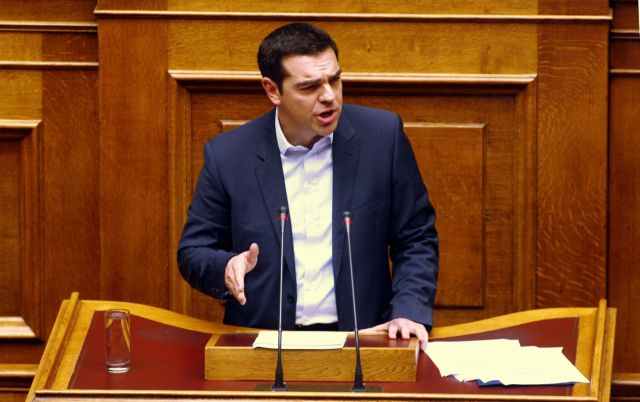When the Prime Minister Alexis Tsipras read out the policy statements in Parliament on Sunday, many European were shocked, as they wrongly estimated that Alexis Tsipras would quickly renege on his proclamations.
As soon as they realized that despite being moderate, the Prime Minister would not give up his main claims and on the contrary is prepared to harden his stance, if need be, caused greater concern and deep considerations.
The telephones literally lit up, as the Commission and European Central Bank representatives in Athens, Mr. Wieser and Mr. Costello, relayed the disappointment, while senior Bank of Greece officers revealed that the climate took a turn for the worse.
It is no coincidence that Messrs Wieser and Costello traveled from Athens to Istanbul, where the Finance Ministers of the 20 richest countries held a conference, in order to relay their impressions from their contacts in the Greek capital.
Since then the warnings of the dangers stemming from the emergent impasse in talks between Greece and Europe have multiplied.
First it was the British Chancellor of the Exchequer who was quick to state that he is working on scenarios to address the impact of a potential Grexit, but it was the former US central banker Alan Greenspan, who shocked when he declared the Greek departure from the Eurozone inevitable.
The Greenspan statement is particularly interest, in the sense that despite having retired, he remains in touch with officers and divheads in the international banking system.
If his estimation is not simply personal, but rather the result of discussions with European Central Bank executives, then things are starting to be come dangerous.
Greek financial officers who are talking with Europeans are quick to document the estimation of the once powerful American central banker, while nothing that the Ministers of the new government underestimated the principles, rules and procedures of the European institutions and bodies and they wrongly believe that everything is political and can be solved politically.
The comments that Mr. Varoufakis made after his meeting in Frankfurt with Mario Draghi confirmed the aforementioned. The new Minister had then declared the discussions to be “encouraging”, but a few hours later the European Central Bank announced measures to restrict funding towards the Greek banks.
It is commonly held that Mr. Tsipras’ proclamations were considered harsh and indicative of an upcoming impasse. Our partners, especially the Germans, do not want to accept that the previous program will not end. They consider the review completion to be non-negotiable and that abandoning it would constitute a retreat which they would be unable to justify in their Parliament, as that was a condition to approve payments towards Greece.
A new cycle of pressure and consultations so that we can come to a compromise began on Monday, because it was estimated that Mr. Tsipras’ proclamations would result in an impasse. International divs, from Obama to the Austrian Chancellor, were quick to contribute their so-called good services towards finding a compromising solution. The G-20 convention found that the impasse in talks is terrifying and that the desire of the 20 richest countries is for the Eurozone to remain intact. Even the chief of the OECD was called up to intervene or better guarantee the reforms of Mr. Tsipras and Mr. Varoufakis.
However the international mobilization of the past few hours does not guarantee a positive outcome and a happy ending in the negotiations. The Europeans, especially the Germans, will not easily accept major retreats, swallow their pride and abandon policies that they defending for years and considered the corner-stone of Europe’s exit from the crisis. In this respect the climate in Europe remains bad for Greece and the Eurogroup on Wednesday will be anything than a walk in the park for Mr. Varoufakis.
Indicative of the pressure is the major turn the Finance Minister made on Monday, which was ever greater than the one the Prime Minister made on Monday. Despite this though, even acceptance of 70% of the bailout terms was not deemed enough. The Europeans are hoping that Mr. Tsipras will deliver a second speech on Tuesday evening, before the vote on the policy statement in Parliament. If he is moderate and flexible in his speech, then Wednesday’s Eurogroup session may go smoother than expected.
The overall moves and statements of government officers are also being evaluated. The recent trip of the Foreign Affairs Minister Nikos Kotzias to Moscow was anything but ignored by the Europeans. Just like Panagiotis Lafazanis’ trip to Beijing.
Likewise, the statements of the Minister of National Defense Panos Kammenos, that funding could be sought out from Russia, the USA and China, were not ignored, despite those in the know reminding the unfortunate experience of Cypriot President Nikos Anastasiadis in March of 2013.
The Governor of the Bank of Greece Yannis Stournaras has not been hiding his concern over the past few days. In his private talks he stresses that he “does not want to see Mr. Tsipras go through Mr. Anastasiadis went through” and estimates that at the final moment the spirit of compromise would prevail, in order to avoid extreme developments.
The truth described however from other sides is that the European leadership, particularly in Germany, is under international pressure and their responsibility towards the international financial system is underlined. According to the reports of American bond management firms, such as Phoenix Capital, the international financial system is threatened by the collapse of the debt market and relapse into a second crisis, more intense than the one in 2008.
Certain cycles suggest that Mr. Tsipras insists upon his hard line, which can only offer opportunities to Greece, they claim.
In any case, the negotiations have reached a turning point and the balance depends on the sensitive, tiny movements from both sides.
The Eurogroup on Wednesday will most likely not be easy, nor will Summit be for Mr. Tsipras the next day. If things do not pan out then the Greek government must be prepared for a second cycle of pressure from Mr. Draghi in funding the Greek economy, which – truth be told – is frozen since Mr. Samaras announced the beginning of the political procedures to manage the crisis last December.
Antonis Karakousis



